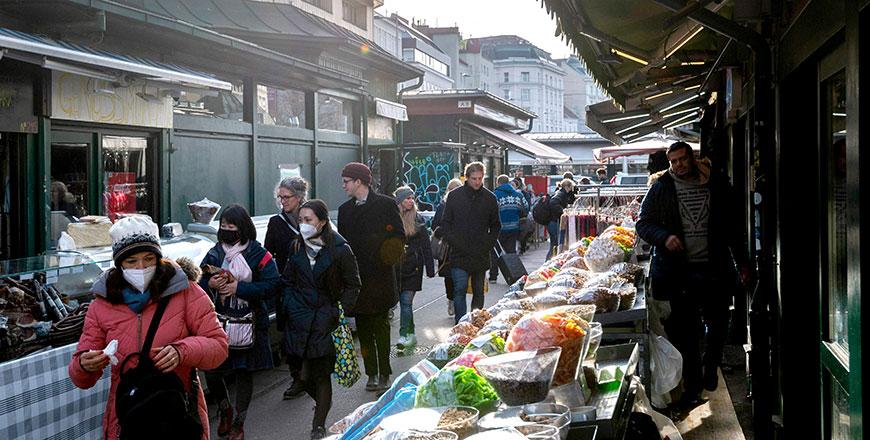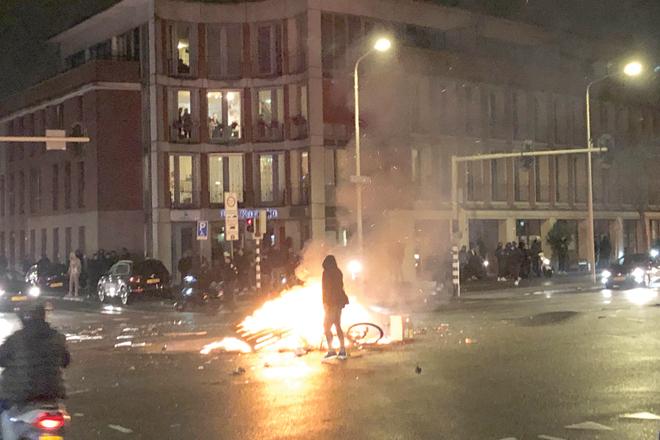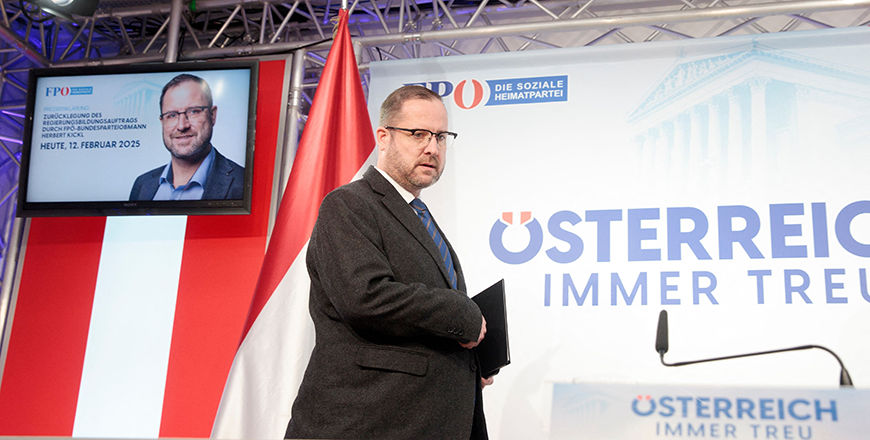You are here
Austria to impose partial lockdown, mandatory jabs
By AFP - Nov 20,2021 - Last updated at Nov 20,2021

People walk through soon to be closed Naschmarkt market in Vienna, Austria on Friday (AFP photo)
VIENNA — Austria on Friday became the first EU country to announce it would make coronavirus vaccinations mandatory and will next week impose a partial lockdown in the face of spiralling infections.
The lockdown, which comes into effect Monday, constitute the toughest restrictions introduced in Europe in recent weeks as Covid-19 cases surge continent-wide, fuelled by vaccine resistance. Austrians will not be allowed to leave home except to go to work, shop for essentials and exercise. The restrictions will initially last 20 days with an evaluation after 10 days, Chancellor Alexander Schallenberg said.
Schools will remain open, although parents have been asked to keep their children at home if possible. Working from home is also recommended.
Vaccination against Covid-19 in the Alpine nation will be mandatory from February 1 next year, Schallenberg said. So far, the Vatican alone in Europe has imposed a vaccination mandate. "Despite months of persuasion, we have not succeeded in convincing enough people to get vaccinated," Schallenberg told a press conference, calling vaccinations the only "exit ticket" out of the pandemic.
At the beginning of the week, Austria sought to impose restrictions on those not vaccinated or recently recovered from the virus, becoming the first EU country to do so.
But infections continued to rise. On Friday, a new record of more than 15,800 new cases were recorded in the EU member of nearly 9 million people.
'Tragedy'
"I was hoping that there wouldn't be a general lockdown," said Markus Horvath as he prepared to shut from Monday his stall selling wooden jewellery at a Christmas market in Vienna. Andreas Schneider, a 31-year-old from Belgium who works as an economist in the Austrian capital, described the lockdown as a "tragedy", saying confining just the unvaccinated had been "reasonable" since they had a choice.
Other European countries are also re-introducing curbs to fight the virus' spread.
On Friday, the German state of Bavaria cancelled all of its popular Christmas markets this year, as well as announced a shutdown of clubs, bars and night service at restaurants. "The situation is very, very serious and difficult," state premier Markus Soeder told a news conference.
Chancellor Angela Merkel and the leaders of Germany's 16 states agreed Thursday to exclude the unvaccinated from restaurants, sporting events and cultural shows.
Hungary, which neighbours Austria, is making mask-wearing compulsory indoors again from Saturday.
Last Saturday, the Netherlands shut bars, restaurants, cafes and supermarkets from 8:00 pm for three weeks with non-essential shops forced to shut at 6:00 pm.
Protests
The Dutch are limited to having four visitors at home and have been advised to work at home unless absolutely necessary with public events scrapped, although schools remain open and people can leave their homes without restrictions. In Austria, demand for vaccinations has increased in recent days, and 66 per cent of the population are now fully jabbed, slightly below the EU average of more than 67 percent. Outside Europe, Indonesia, Tajikistan and Turkmenistan have made Covid-19 vaccination mandatory, while French Pacific territory of New Caledonia has also decided to impose vaccination from the end of December.
On Friday, Austrian opposition party NEOs said the government should have acted sooner to avoid intensive care units from struggling and thus prevent another lockdown -- the fourth in the country since the pandemic hit Europe last year.
"Austria is now a dictatorship!" said Herbert Kickl, the head of the far-right Freedom Party (FPOe), which was a junior partner in the country's last government, referring to the plan to make vaccinations mandatory.On Sunday, hundreds demonstrated against the lockdown for the unvaccinated. The FPOe is planning a bigger rally on Saturday though Kickl will miss it as he has contracted the virus. On Monday, Vienna city authorities also became the first in the EU to start inoculating children between the ages of five and 11. They said they would increase the offer in line with high demand even though the European Medicines Agency has not yet approved any of the coronavirus vaccines for the five-to-11 age bracket. Canada on Friday became the latest country to authorize the Pfizer-BioNTech Covid-19 vaccine for children aged between five and 11-years-old.
Related Articles
THE HAGUE — Tens of thousands took to the streets in cities across Europe and Australia Saturday as anger mounted over fresh COVID restricti
BERLIN — Germans faced the stark warning on Monday that they would be either "vaccinated, cured or dead" from COVID by the end of winter, as
VIENNA — While negotiating with the conservatives to form a government, sharp-tongued Herbert Kickl was within reach of becoming contemporar


















